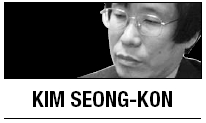Young Koreans are huge fans of American espionage and counter-terrorism television dramas. For example, “24,” “The Unit” and “Alias” enjoy immense popularity in Korea. Few young viewers, however, seem aware of the fact that counter-terrorism TV dramas are criticized by American leftist critics as rightwing extremist shows saturated with conservatism and militarism.
The critics’ suspicions are not totally ungrounded. Both “24” and “Alias” were first aired in 2001 when George W. Bush was inaugurated as the 43rd president of the United States, as if heralding the advent of the age of “war on terror.” “24,” which was produced for the well-known conservative Fox Network, ended with series finale broadcast in 2010. “The Unit” was first aired in 2006 and ended in 2009 when Barak Obama was elected the 44th president.
“24” has been controversial because of its “ends justify the means” message. The lead character in the series, Jack Bauer, is a highly competent CTU (Counter Terrorist Unit) agent who does not hesitate to torture suspects when national security is at stake.
Season seven begins with a congressional hearing at which Bauer is being questioned for his allegedly extreme measures against a terrorist suspect named Hadad. Bauer protests against the accusation, saying: “Abraham Hadad had targeted a bus carrying 45 people, 10 of whom were children.” Then Bauer continues resolutely, “The truth is, senator, that I stopped that accident from happening.”
To the senator’s immediate indicting question “By torturing Hadad?” Bauer retorts squarely, “By doing what I deemed necessary to protect innocent people.”
Even during the congressional hearing, the FBI needs Bauer to locate a terrorist named Tony Almeida who has breached a firewall protecting government computer infrastructure. Indeed, Bauer is a modern-day American hero who can thwart all sorts of terrorist plots against America, including nuclear, chemical and biological attacks. During the process, Bauer is presented as a man who often ignores humanity and morality in order to protect America and her people from terrorism.
In that sense, Bauer seems to strictly uphold the U.S. Patriot Act, which has been in effect since 2001. According to the controversial law, a terrorist suspect can be detained without a lawyer, and American law enforcement agencies can search e-mail communications, telephone calls, and financial records in the name of national security. It also gives the Department of Homeland Security the power to detain and deport immigrants whenever they are suspected of terrorism-related activities. Thus liberals poignantly criticize the act, pointing out that it seriously hampers democracy, civil liberties, and human rights. In that sense, “24” seems to vividly illustrate the problems of the Patriot Act.
Notwithstanding its conservative attitude, however, “24” poses some serious moral questions for us to ponder. In season eight, for example, Islamic extremists threaten to detonate a nuclear bomb in Manhattan, which could kill tens of thousands of people and devastate the area with nuclear radiation for a hundred years. The terrorists will only stop the attack if the U.S. government hands over the peace-seeking Islamic leader, President Omar Hassan, so that they can execute him as a traitor.
There is a heated debate over this issue in the White House between President Allison Taylor and her chief of staff, Ed Weiss. The former asserts that one man’s life is as precious as many, and the latter contends that one man’s sacrifice is justified if it can save many lives.
“One man is not worth the lives of tens of thousands of people,” Ed Weiss argues, “The irradiation of all those people! And real businesses and real homes uninhabitable for a hundred years or more!” Indeed, it is a serious moral dilemma, but to the leftist critics’ surprise (or dismay), “24” takes side of President Taylor who decides not to cave in to the terrorists’ demand.
“The Unit,” which is based on Eric Haney’s book, “Inside Delta Force: The Story of America’s Elite Counterterrorist Unit,” has also been widely criticized for its rightwing militarism. In one episode, however, the wife of a Delta Force sergeant protests to the anti-military demonstrators, “While soldiers risk their lives to protect you and your family, what have you done for your country? Political rallies like this at best?”
Indeed, during their covert counter-terrorism operations, the Delta Force soldiers often face moral dilemmas. Of course, decisions are never easy; most of the times, they face a “Sophie’s choice” type of dilemma that will lead to grave consequences regardless of their decision.
We cannot condemn “24” and “The Unit” simply because they reflect rightwing conservatism. Even such dramas present us with moral agonies that enlighten us and enable us to ponder the value of human lives. By the same token, we cannot dismiss liberal, counter-cultural situation dramas such as “South Park” either. We should have the capacity to embrace the two antagonizing ideologies, without excluding any views. Only when we are capable of understanding and embracing all sides, will terrorism and extremism vanish from this world for good.
By Kim Seong-kon
Kim Seong-kon, a professor of English at Seoul National University, is president of the Association of Korean University Presses. ― Ed.






